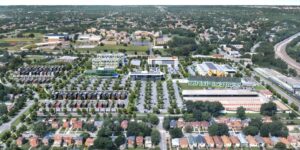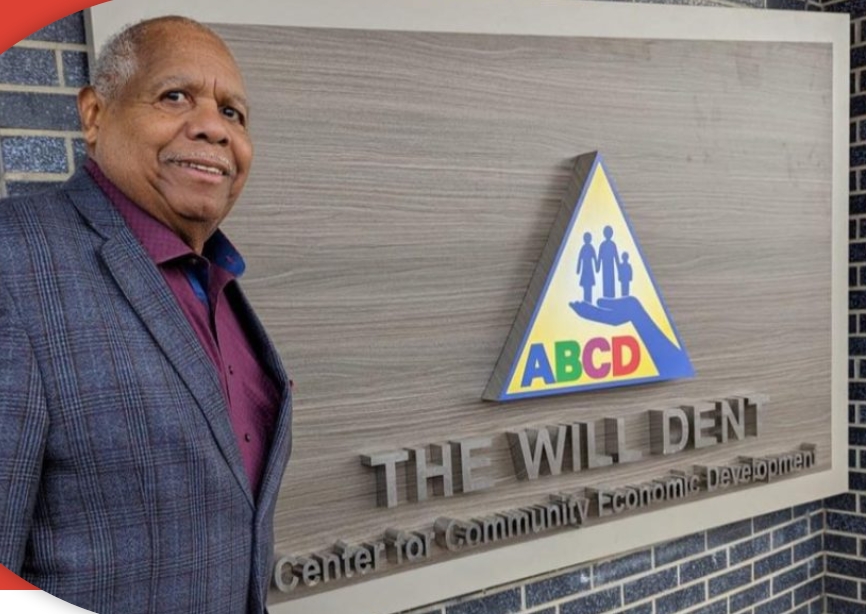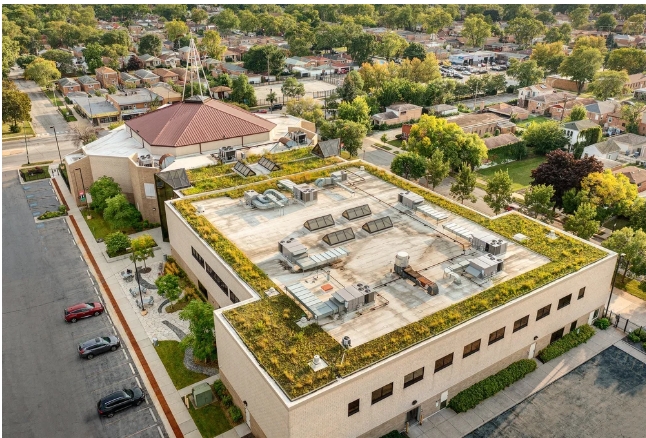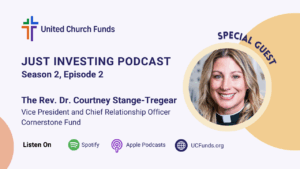Trinity Chicago's Imani Village Highlighted in Crain's Business
Reposted from Crain's Chicago Business
Imani Village Lays Down a Model for Transforming Far South Side
by Judith Crown, October 14, 2025

Over the summer, Chicago seniors began moving into a $36 million, 70-unit building with modern appliances and community spaces just steps from a new Metra station scheduled to open in 2027. It’s the first project at Imani Village at 95th Street and Cottage Grove Avenue, a mixed-use development initiated by Trinity United Church of Christ.
Trinity says Imani, which means faith in Swahili, is envisioned as a beacon of hope in a neighborhood accustomed to poverty and disinvestment. It’s a “blueprint for transforming the face and future of Chicago’s Far South Side,” according to the Pritzker Traubert Foundation. The project is a finalist for the foundation’s 2025 Chicago Prize , which supports real estate development on the city’s South and West sides.
“We're building a model community, and we're anchoring the 95th Street Corridor Plan,” says Patricia Eggleston, executive director of Imani Village. The project is inspired by principles of economic development, health equity, environmental justice and reversing the negative impact of mass incarceration, she says.
The Chicago Prize comes with a $10 million grant over three years, which could provide leverage for the additional funding needed for ambitious plans that include a second building for seniors, a hotel, an athletic and wellness center, and a food hub. A social enterprise, Imani Village has plans to convert a former steel distribution facility into a manufacturer of single-family modular homes.
Earlier this year Advocate Health Care announced plans to add an immediate care center to its outpatient clinic at Imani, a $10 million investment. The expansion will add 4,600 square feet to the clinic, which opened in late 2018, and include equipment to support triage and treatment, cardiac and vascular diagnostics, imaging services and virtually assisted care. It is scheduled to open by the end of the year.
Trinity started acquiring land at the site in 2009, spending $7.65 million over five years to purchase 27 acres, with another 8 acres pending, Eggleston says. A $6.7 million loan from the Cornerstone Fund of the United Church of Christ was used to build the Advocate clinic.
A charter school on the site was converted to community and office space for Trinity’s nonprofit arm, The Endeleo Institute. The senior apartments, built with co-developer SPM Properties, required a capital stack that included tax credits and participation by the city of Chicago, the state of Illinois and the U.S. Department of Housing & Urban Development. A second group of 62 apartments also is planned.
An ambitious part of the plan is conversion of the former Carpenter Technology steel distribution facility to build modular homes, called Imani Works, in partnership with Chicago-based builder Inherent L3C, which has been constructing affordable single-family homes on the West Side since 2022. Inherent will manufacture the first batch of homes at its West Side facility, then “gradually train us and our partners,” Eggleston says.
Imani’s vision and its standing as a finalist for the Chicago Prize open a major opportunity, says Juan Sebastian Arias, executive director of the nonprofit Elevated Chicago, one of the partner agencies on the plan to revive the 95th Street Corridor. “With all the infrastructure investment in the works, Imani will continue as a major hub of activity and it can be a generator of equitable community wealth building,” he says.
Cornerstone Fund Guests on United Church Funds Podcast
The United Church Funds "Just Investing" podcast had Cornerstone Fund VP & Chief Relationship Officer Rev. Dr. Courtney Stange-Tregear as a guest this week. They talked about what we mean by "God Math," and so much more. Listen by clicking on the image, or on the podcast services listed below.
Listen and Subscribe On:
General Synod 35 Sponsors, Including the Cornerstone Fund, Offer Generous Contributions to Those Gathering in Kansas City
Written by Renee DeLuca
 When the United Church of Christ gathers in Kansas City this coming July 11-15 for General Synod 35, there will be many generous donors to thank for making it happen. Through these partnerships, UCC members, colleagues, and national staff will gather for inspirational worship and fellowship, engaging youth activities, and plenaries that lift issues that demand a faithful witness.
When the United Church of Christ gathers in Kansas City this coming July 11-15 for General Synod 35, there will be many generous donors to thank for making it happen. Through these partnerships, UCC members, colleagues, and national staff will gather for inspirational worship and fellowship, engaging youth activities, and plenaries that lift issues that demand a faithful witness.
Once again, the five UCC financial ministries have joined to pledge a large chunk of those contributions at $65,000. Great thanks go to the Church Building & Loan Fund, Cornerstone Fund, Insurance Board, the Pension Boards and United Church Funds. The UCC financial ministries have a long history of providing resources and services to help protect and grow churches, and they have stepped up once again as we go “Into the Deep,” the theme of this year’s Synod.
Representatives of the financial ministries will be present during Synod, with exhibits, learning opportunities and more. Attendees will be able to discover the many different services, resources and programs that they each offer.
Grateful to our partners
“We are grateful to our partners and champions for their continued commitment to the United Church of Christ. Sponsor funding for General Synod is an important supporting component to offering this extraordinary and inspiring event,” said Michelle Carver, director of philanthropy for the UCC National Ministries. “We are excited to engage with everyone as together we explore Into the Deep at Synod in July.”
There are others to thank as well.
Silver Sponsors ($5,000):
Affiliated UCC seminaries for their joint sponsorship of $3,000:
- Andover Newton Seminary at Yale
- Chicago Theological Seminary
- Eden Theological Seminary
- Moravian University/Lancaster
- Pacific School of Religion
- United Theological Seminary of the Twin Cities
Bronze Sponsor ($2,500):
The Rev. Dr. Ron Patterson and Ms. Charnley Marsden.
Blue Sponsor ($1,000):
To learn more about sponsorships at General Synod 35, visit the website here.
Registration is open for General Synod now. You can make your reservation HERE.
New HQ and Workforce Development Center Amplifies Impact of Nonprofit, With Help From the Cornerstone Fund

"There are people who are cold, who don’t have a furnace, and ABCD can provide resources for them,” says Darlene Knott. “There are people who don’t have transportation to go to their doctors or their jobs and ABCD is able to get them there, to give them some independence. ABCD does so much for the community, and it’s so rewarding to see that impact and to be part of helping people.”
Reducing poverty, fostering self-reliance, and empowering communities in Stark County, OH, to achieve self-sufficiency has been the mission of ABCD since its establishment in 1973. The Community Development Corporation based in Canton accomplishes this by providing affordable housing, transportation, and training in construction and energy conservation to area residents. Will Dent, ABCD’s founder and CEO, says Knott exemplifies what the organization’s work is all about.
“Darlene started in one of our training programs right out of high school,” Dent explains. “She got early exposure to finance and business, and we hired her in our accounting department. This is one of the prizes of ABCD’s work. Over the past 40 some years, she has learned and worked her way up. Now she’s our chief financial officer and getting ready to test for her CPA.”
Thanks to a recent development project, ABCD is poised to further strengthen the community by helping more Stark County residents like Knott achieve their goals in the years ahead. The organization’s new facilities – which include a 14,480-square-foot former bank branch renovated to serve as ABCD’s headquarters and a newly built 23,000-square-foot facility to house the organization’s fleet of vehicles and workforce development programming – are helping to revitalize Canton’s Crystal Park neighborhood, make ABCD’s services more accessible, and position the nonprofit for an additional phase of development on a nearby property that will create high-quality housing for seniors.
By renovating the former bank branch to serve as its headquarters – named the Will Dent Center for Community & Economic Development in recognition of Dent’s 50-plus years of leadership of ABCD – the organization upgraded its administrative facilities and created high-quality offices for other local mission-driven organizations not yet ready for facilities of their own. Current tenants include the Stark County Black Nurses Association, the Canton Community KidSummit Against Drugs, and WATOES, which provides a variety oF services to support local families.
With its new job training facility, which includes garage space for up to 30 vehicles, ABCD will be better able to connect Stark County residents with jobs and other resources needed to thrive. The organization currently provides more than 100 rides daily for seniors and individuals with disabilities; residents with no other way to get to work; and individuals connected to the organization through contracts with local schools, colleges, day care centers, and churches.
“Transportation is one of our most visible services,” says Dent. “We currently operate 14 vehicles and they are going 24/7. We have people who need to start dialysis at 3 or 4 in the morning or who have a specialist they need to see on the other side of the state. They might not have any other way to get there, so we take them. We have also recently gotten more into workforce transportation. We’re giving a lot of people an opportunity to get back to work.”
To facilitate its $9.3 million development project, ABCD secured funding from the Ohio Finance Fund and the City of Canton through a Community Development Block Grant, used its own equity, and leveraged a $2.8 million loan from IFF and a lending partner, the Cornerstone Fund. The Crystal Park project is a significant step for ABCD as it continues to expand its capacity and impact, and Dent says IFF’s partnership has been instrumental in bringing the organization’s vision to fruition.
“I knew about IFF but hadn’t worked with them. There was a nonprofit in town – a halfway house, Community Restoration Centers of Stark County (CRC) – that had been trying to get financing for years. All the banks had turned them down,” he says. “I put them in touch with IFF. With IFF financing they moved to a new location and transformed it into a really nice facility only about six blocks from here.” CRC broke ground on the renovation of the 75-bed facility in November 2017 and opened for clients in October 2018.
“So, we’ve had a great relationship with IFF for some time,” continues Dent. “When we started this project, IFF was the first one we approached about financing. And then IFF helped connect us with the Cornerstone Fund and other partners who have been instrumental in helping us revitalize this neighborhood.”
Having moved into its new facilities in Crystal Park last year, ABCD is now focused on the next phase of the project — the construction of a mixed-use facility expected to begin this fall. The Stephen A. Perry Lofts, named to honor a former Canton resident who was CEO of the nearby Pro Football Hall of Fame, will include 24 two-bedroom, two-bath apartments. The development will meet a pressing need in Canton for additional housing options for older adults, and the ground floor of the facility will feature retail and office space that will provide ABCD with additional revenue to support its programs. Still in the planning stages, ABCD is also considering housing a museum dedicated to the O’Jays, an iconic R&B group formed at a Canton high school only a few miles away. Once the housing project is completed, the entire complex will be known as O’Jay’s Plaza.
Housing has always been at the crux of ABCD’s work and this new project will build on the organization’s extensive history ensuring that more Stark County residents have access to quality, affordable homes.
“The key to our whole existence has been helping people and changing lives,” says Dent. “We’ve built three senior living facilities and more than 400 single-family houses. When you see people who have gone through our programs to become a first-time homeowner, you can see the change in them. It builds them up, builds their confidence, and that doesn’t just position them for success. It transcends the individual and becomes about how collectively they can join in building up and supporting their community.”
5th Annual Southern New England Conference of the United Church of Christ Meeting Keynote Focused on Growing with the Help of 'God Math'
Written by Marlene Gasdia-Cochrane
Article from the news page of the Southern New England Conference of the United Church of Christ website.
Seven years ago, eighty beachgoers spontaneously formed a human chain to save a family of nine trapped in a rip current. It took everyone working together to bring those individuals, unharmed, back on land.
That’s how the Keynote Speaker for the 5th Annual Meeting of the Southern New England Conference, the Rev. Dr. Courtney Stange-Tregear, introduced the concept of “God Math.”
“They came together and did together what not one of them, truly, could have done on their own. They saved lives, together,” she said. “There was no plan for it. They didn’t know how to do it. They hadn’t taken a course on it . They didn’t have architectural drawings and they didn’t have a savings account and they didn’t have, surely, a line item in their budgets for it. And yet still, somehow, somehow, they did. They came together and together they saved lives when not one of them working alone could have done it. That sounds to me like some God Math.”
Stange-Tregear, Chief Relationship Officer for the Cornerstone Fund, went on to talk about how the key to God Math is combining “need” and “calling.”
“On that beach, in that ocean, that family had a desperate, critical need. An important, sudden, right-now immediate need. And the people on the beach, thankfully, were uniquely positioned to meet that need. That was their calling,” she said.
She went on to point out that there are needs all around our churches and institutions, and that we are called to meet them in unique ways.
“I maybe heard about this chain story when I was having lunch away from the beach and I maybe would have wanted to be part of that chain but if I wasn’t there, that wasn’t my calling. Needs are specific. Calling is unique. And these things come together. And yet even that isn’t enough,” she said.
“Sometimes we think that we are the only ones in charge of our destiny or our fate. We think that if we work hard enough and we study hard enough and we plan enough that it’s all going to just work out and we forget to make space for God. We forget to make space for God in our story, in our calculations, and in our addition. We forget to make space for a math that we couldn’t imagine working out. We forget to make space for the story going in a different direction than we could have imagined it going,” she said.
Stange-Tregear went on to talk about how the financial ministries of the United Church of Christ are built to carry out God Math. The idea, she said, is enabling churches to take on ambitious, faith-based projects that may seem financially daunting at first glance, but become feasible when viewed through the lens of faith and community support.
Stange-Tregear said many churches have their money invested somewhere, in different institutions, but often don’t know what that money is doing, or where in particular it’s being invested. With the Cornerstone Fund, they know that their investments are working to help other churches carry out mission, while at the same time allowing them to earn a return on their investment.
She shared several examples of “God Math” in action. One such instance was a congregation that took out a $4.6 million loan to renovate an unused hall to provide housing and support services for men in need. Because the project met a clear community need, the county pays the church approximately $1 million per year, effectively covering their loan repayments and the cost of caseworkers.
Another example was a church that invested in a large solar panel installation. Despite the initial cost, the project was largely reimbursed through government incentive programs, and the savings on energy bills allowed the church to pay off their remaining loan in just two years.
During the Q&A session, Stange-Tregear addressed concerns about the risk associated with such large projects. She assured attendees that the Cornerstone Fund has a robust underwriting process in place to mitigate risk and works with congregations to develop viable and successful plans.
The address concluded with Stange-Tregear reinforcing the message that the financial ministries are there to support and guide congregations, and encouraged attendees to reach out for assistance or advice. She emphasized that her role and the role of her colleagues is to offer support and guidance to those in need, and encouraged attendees to reach out with any finance, growth, or insurance-related queries.
“When you find yourself in need or having a question or even a hope. Or a wonder of what could be has anything to do with finance or growth or insurance or struggles, know that your financial ministries are here for you,” she said.
“I don’t think God calls us only to sacrifice,” Traeger explained. “We are not called only to work harder and harder. We are called to find somebody to hold our hand. We are called to find many somebodies to hold hands and build a chain. We are called to lighten the load of one another. To work together. To do together.”
“We really can trust and believe that when we come together, we can all win. We can all benefit. We can all have a place. In God’s house and in God’s math.”
Lincoln Memorial Congregational Church Strives to Impact South L.A.
Source: Los Angeles Sentinel
Abstract: The desire to positively impact South Los Angeles inspired Pastor Wendell Miller and the members of Lincoln Memorial Congregational Church to explore avenues to make a tangible difference. The church, located at 4126 Arlington Ave., already operates several outreach ministries and even rent space to a local charter school. Yet, the parishioners wanted to do more to help their community.








